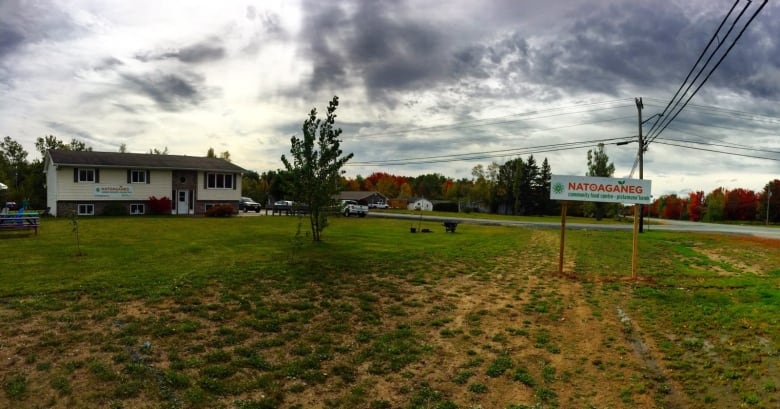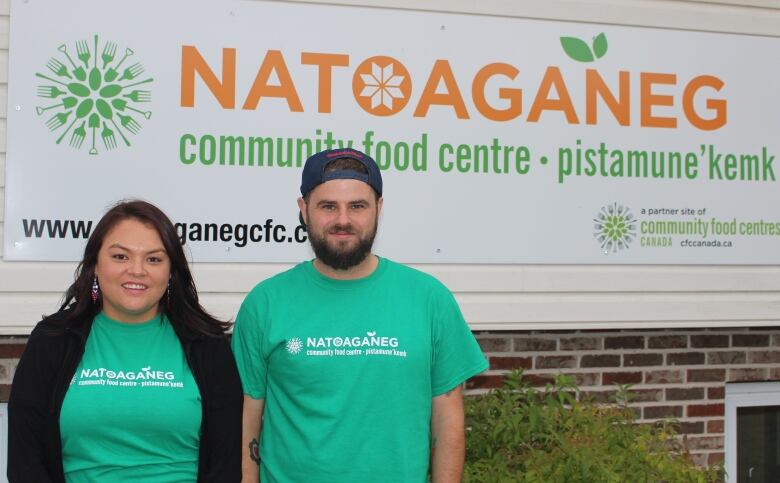Meet the people of Eel Ground First Nation who are using food to reclaim culture
The return of traditional foods and a community space has become a catalyst for healing in Natoaganeg

There are about 650 people who live on the Eel Ground First Nation, along the Miramichi River, and it's a safe bet that Freda Simon, 64, has served a meal to just about every one of them.
The Mi'kmaq elder started making toast with Cheez Whiz for students at the Natoaganeg School 12 years ago as part of her efforts to teach them their native language.
"They were tired, they didn't want to do nothing. But once they get that energy in you after eating, they're all good."
That simple act of making toast to help students learn, has become a community-wide movement focused on feeding everyone in Eel Ground wholesome, traditional food as a way to better health and healing.
Food centre opening a celebration
Early in October, the people of Eel Ground gathered to celebrate the opening of the Natoaganeg Community Food Centre with song, speeches, and a feast.

The centre, which is a split-entry home on the main drag, is a bright space where people can sit down for a hot meal twice a week, pick up produce and wild meat from the local food bank, learn to prepare traditional, healthy meals and volunteer.
Our mission is to build health, belonging and justice in low-income communities across the country through the power of food.- Nick Saul, Community Food Centres Canada
It's a partnership with the Toronto-based organization, Community Food Centres Canada, which is led by president and CEO Nick Saul.
"Our mission is to build health, belonging and justice in low-income communities across the country through the power of food," Saul told the crowd gathered to celebrate the opening in Eel Ground.
"We have this vision that Canada needs to view food as a basic human right … where everyone has the financial means, voice and knowledge to access good food with dignity."

The Natoaganeg Community Food Centre is the tenth in Saul's network across Canada. It is the first in New Brunswick, and the first in an Indigenous community.
"This is a proud nation, the Mi'kmaq, who know about hunting and fishing and strawberries and blueberries and gathering and we need to take that into our movement … There are a lot of First Nations Indigenous communities that are looking at what's happening here and we are learning," said Saul.
Return to traditional food
With about 40 per cent of his people struggling with food insecurity, and poverty, Chief George Ginnish said having partners like Saul, and longtime supporter Canadian Feed The Children, is crucial.
"It's a huge thing to wrestle with, and partnerships like this, they help," he said. "They're not everything, but it helps because the reality is that we're dealing with intergenerational trauma."

Ginnish said the Mi'kmaq of Natoaganeg are fighting to reclaim their identity, and access to traditional, healthy food will help give them the strength to eventually win that fight.
"When your rights, your language, your culture, has been looked at as inferior for 200 plus years … there's a lot of folks that are struggling to find their direction," said Ginnish, who has been chief for more than 20 years.
"It will be generations before we can say that, 'OK, maybe we've got this on the run.' Yes, we've invested in our language, in our culture. In order to be comfortable in our skin, we need to know where we come from."

Ginnish points to a study of his community that found people were eating, on average, one tablespoon of traditional food per day.
"You might have a little chunk of salmon you know, every two weeks. That's not a diet that we would have been accustomed to for many thousands of years … It's just everything's quick, everything's easy, everything's full of sugar, so it's a struggle."
Only 20 per cent of the adults in Natoaganeg report being in good health, compared to 60 per cent of adults in Canada
A food philosophy of 'take-out'
Erica Ward, program manager of the Natoaganeg Community Food Centre, didn't grow up eating traditional foods like salmon or moose, but she eats them regularly now with her seven-year-old son.

"Moose meat was something I might have tried to cook once or twice before starting my job here … Now, from fall till spring, I only cook with moose meat. I don't pick up hamburger anymore at the grocery store."
"Today was the first time I've ever had eel," she said at the official opening, where eel, striped bass and roasted beets were served.

As people head home after the traditional feast, one woman calls back to Ward, "Thank you, it was good. I'm usually a fast-food person but everything was delicious."
"Expand your horizons," Ward fires back. "Yea exactly," the woman laughs.
I haven't heard anybody yet say they haven't liked canned moose meet … they try it and they're like, 'Whoa — this is delicious.'- Erica Ward, program manager
Chad Duplessie, manager of the Food Centre, said exchanges like that show him that even though "the food philosophy in Eel Ground is take out," the work they are doing is worthwhile, and is giving people a chance to rekindle a relationship with healthy food.
"It's such a traditional thing for a hunter to go out in the bush, to take down a moose, to bring it back, to put it on a hot element.. and serve it to their community. That's as old as the day that story — and I think we're just helping to bring back that story."
The guy with the carrot tattoo
Duplessie, who is known in Eel Ground as "the guy with the carrot tattoo," explained the significance of the art work, and how it ties in with the food centre, at the opening.
Like Freda Simon, he knows that something simple, like a piece of toast, or a carrot, can have a big impact.

"The idea that we can't see necessarily what's happening but it's still worth the effort," he said, drawing an analogy between a carrot, and the food centre.
"It's such a thrill when you get to pull [a carrot] up and you're like, 'Oh shit, there's a real good one,' and I think that's what we're growing here — we're growing a real good one."
Ward agrees something is happening, and people are embracing and trying traditional foods, such as canned moose, which the food centre is reintroducing.
"I haven't heard anybody yet say they haven't liked canned moose meet, especially people who say they don't like moose meat and then they try it and they're like, 'Whoa — this is delicious.'"
Finding identity through food
Sitting together at the food centre, Jessica Larry and Tobi Russo relax after the dinner, while their five-year-old sons play together downstairs.
"What was really big to me about this place was bringing back their traditional roots," said Larry who volunteers at the centre. "We eat wild meat and fish and I grow my own vegetables so that, to me, was a really big thing … instilling that back in people."
Russo said the chief hit the nail on the head when he said food plays a big role for First Nations people trying to find their identity. She is from Eel Ground, but was adopted as a child and grew up an hour-and-a-half away.
"I didn't even know I was First Nation until I was maybe 10 or so. There was only me and one other boy at school that were brown."

Russo said when she found out, she remembers trying to ride her BMX bicycle the 150 km distance from Tankville to Eel Ground.
"The food is like the centrepiece of bringing back the language and the culture because so much of the culture is surrounded or involves being able to go get the food, and to prepare the food … People have been gathering that way for centuries and we got away from it."
For John Metallic, the food centre has given him an opportunity to reconnect with his community.
After 20 years in the United States, Metallic said he came home to "fix myself up and get things straightened out."

At the opening ceremony, Duplessie presented him with an award, saying he is a huge role model.
"We want to give him a big pat on the back," Duplessie said. "John is [an example of the type of] relationship we want to have with every person who walks in here."
A place to 'reimagine a different path'
The new centre is a complete departure from Natoaganeg's old food bank, where people lined up after hours at the band hall's back door for a hamper of instant noodles and hot dogs.
"The evolution is to create the most dignified, most pleasurable experience to access food the same way I would if I went out for dinner with my wife," Duplessie said.

All of Saul's community food centres include table service, which to him signifies a "dignified seat" for everyone who walks through the door.
"It's going to smell good, it's going to taste good, They're going to meet their neighbours and feel less isolated and less lonely and start to reimagine a different path for themselves," Saul said.
Ward describes the new centre as a beautiful space where people are invited to "bring their best selves," and she said that is already happening.
"When you see participants of programming coming in to get the food bank distribution and they're actually turning around and mopping the floors and sweeping, or asking, 'Can I try and cook? Can I come and help?,' that right there is huge," she said.

'We serve good food'
Back at the Natoaganeg School, Freda Simon is preparing fish, potato wedges, salad and fruit for about 80 students who will be sitting down for lunch in a couple of hours.
The toast she started serving 12 years ago as a way to settle hungry bellies, is now a community-wide effort that includes the Community Food Centre, and two meals every day, for every student.

In the kitchen at the new kindergarten to Grade 8 school, Simon is humble, but proud of the food she serves.
Her menu regularly includes wild meat, fish and believe it or not, a very popular salad bar.
"Even one kid said, 'Oh I want more vegetables,'" Simon said. "I said, 'I'll give you more,' as long as you eat them that's good enough for me."
They were asked, 'Do you want a pizza party?' They said, 'No, we want chicken and salad,' so that blows your mind that they're more health conscious … than many of their parents or grandparents.- George Ginnish, chief
"Way back when, when I was growing up, my dad would hunt moose and we used to have an old barn and we just put it there and whoever wants it, goes and gets a piece. You know we all gave. But it's not like that today."
The chief says the students are proof that eating traditional food will improve health and well-being, with obesity levels among their young people dropping.
"These little buggers have embraced their salad bar," Ginnish said with a laugh.
"They won this contest and they were asked, 'Do you want a pizza party?' They said, 'No, we want chicken and salad,' so that blows your mind that they're more health conscious — than many of their parents or grandparents."